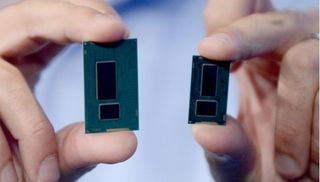Intel's defective production process will delay the release of Broadwell

Last month I sat in front of new Intel CEO, Brian Krzanich, as he held up 'working' Broadwell silicon on stage at the Intel Developer Forum. I even saw one running in a test system, zipping through CPU benchmarker's friend, Cinebench. Yesterday, though, he announced during a briefing call about Intel's latest financial results that they would be delaying the production of Broadwell chips until the first quarter of next year. We were then expecting to see Broadwell products knocking around next Spring, but with this slip in production it's likely to be the Summer of 2014 at the earliest.
So what went wrong? Well, according to Krzanich it was all a problem of yields. They simply couldn't get enough functional processors out of the large silicon wafers they produce. He called it a “defect density issue.” Apparently Intel have already fixed the problem in the production process and are now “comfortable with where we are at with yields.” Sadly that still means the whole release of the next generation processor is going to be pushed back around 3-4 months.
To be honest I'm glad they've caught Broadwell's problem early and not released a chip or chipset with the sort of problems we've seen in the last few Intel launches. Early Haswell machines didn't play nice with USB 3.0 ports and the Sandy Bridge chipset screwed up SATA connections - it would be nice to have a properly functional new Intel platform right from the off.
The biggest gaming news, reviews and hardware deals
Keep up to date with the most important stories and the best deals, as picked by the PC Gamer team.

Dave has been gaming since the days of Zaxxon and Lady Bug on the Colecovision, and code books for the Commodore Vic 20 (Death Race 2000!). He built his first gaming PC at the tender age of 16, and finally finished bug-fixing the Cyrix-based system around a year later. When he dropped it out of the window. He first started writing for Official PlayStation Magazine and Xbox World many decades ago, then moved onto PC Format full-time, then PC Gamer, TechRadar, and T3 among others. Now he's back, writing about the nightmarish graphics card market, CPUs with more cores than sense, gaming laptops hotter than the sun, and SSDs more capacious than a Cybertruck.
Most Popular

